allah has guided his pilgrimage
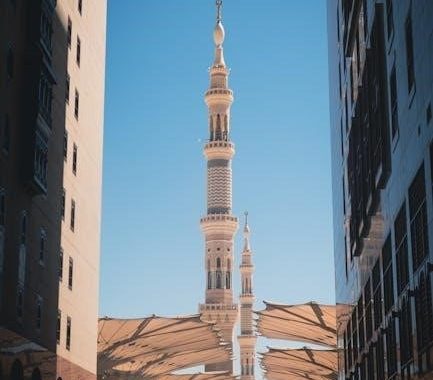
allah has guided his pilgrimage
Allah has guided His pilgrimage, emphasizing trust and submission to His will․ Pilgrims embark on this sacred journey with unwavering faith, reflecting the essence of devotion and obedience to divine guidance․
This spiritual endeavor fosters a deep connection with Allah, reminding believers of His mercy and grace in guiding them through life’s challenges and the pilgrimage’s rituals․
Pilgrimage, or Hajj, is one of the five pillars of Islam, representing a profound act of worship and devotion to Allah․ It is a sacred duty for all able-bodied Muslims, embodying spiritual growth and unity among believers․ The pilgrimage to Makkah, the holy city, is a once-in-a-lifetime obligation, though many perform it multiple times․ Umrah, a lesser pilgrimage, can be undertaken at any time of the year․ Both rituals reflect a deep connection to Allah’s guidance, emphasizing faith, humility, and submission to His will․ The pilgrimage is not just a physical journey but a spiritual one, fostering self-refinement and a renewed commitment to Islamic teachings․
The Significance of Hajj and Umrah in Islamic Faith
Hajj and Umrah are cornerstone acts of worship in Islam, symbolizing a Muslim’s devotion to Allah and their commitment to spiritual growth․ Hajj, one of the Five Pillars, is a mandatory once-in-a-lifetime obligation for all physically and financially capable Muslims, while Umrah is a voluntary act of worship․ Both pilgrimages foster a deep sense of unity among believers, as millions gather in Makkah to perform sacred rituals․ These journeys are not only acts of obedience but also opportunities for self-reflection, forgiveness, and spiritual renewal․ By following the footsteps of Prophet Ibrahim and the Prophet Muhammad (peace be upon them), pilgrims reaffirm their faith and submission to Allah’s divine guidance․

Historical and Cultural Significance of Hajj

Hajj is a centuries-old tradition, uniting Muslims worldwide in a shared spiritual and cultural experience․ It reflects Islamic heritage and fosters unity, equality, and devotion among believers․
The Importance of Makkah as the Holy City
Makkah holds profound significance as the birthplace of Prophet Muhammad and the location of the Kaaba, Islam’s holiest site․ It is a unifying force for Muslims worldwide, embodying spiritual and historical richness․ Pilgrims flock to Makkah to fulfill Hajj and Umrah, connecting with divine guidance and Islamic heritage․ The city’s Grand Mosque, surrounding sacred sites, and the Kaaba symbolize Allah’s presence and mercy, making Makkah a focal point of worship and reflection․ Its enduring importance lies in its role as a sanctuary of faith, where believers seek spiritual renewal and closeness to Allah, reinforcing their commitment to His guidance and teachings․
The Role of the Kaaba in Islamic Pilgrimage
The Kaaba, located in Makkah, stands as the most sacred site in Islam, serving as the spiritual epicenter for all Muslims․ It is the focal point of the Hajj and Umrah pilgrimages, with rituals like Tawaf (circumambulation) and Sai (running between Safa and Marwa) centered around it․ The Kaaba symbolizes unity, divine connection, and the oneness of Allah․ Pilgrims direct their prayers toward it during their journey, emphasizing its role as a unifying symbol of Islamic faith․ Its significance is deeply rooted in Islamic history and tradition, making it an indispensable element of the pilgrimage experience, where believers seek Allah’s guidance and blessings․
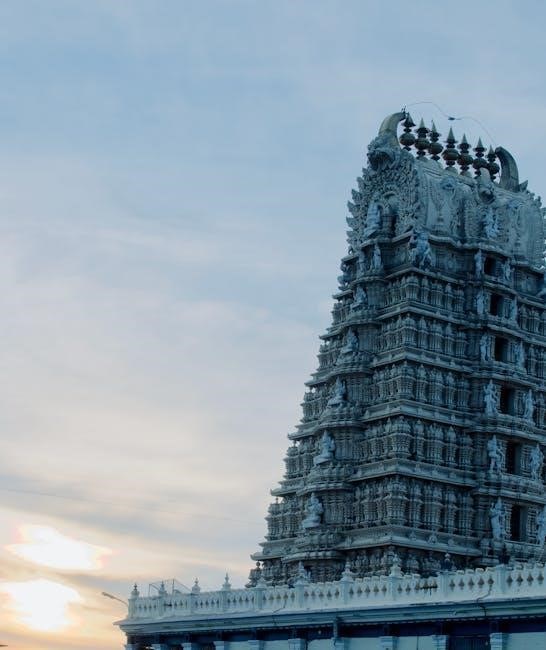
Spiritual Preparation for the Pilgrimage
Spiritual preparation for the pilgrimage involves cleansing the heart, seeking Allah’s guidance, and fostering sincere intentions, reflecting deep faith and trust in His divine will․
The Role of Faith and Trust in Allah’s Guidance
Faith and trust in Allah’s guidance are the cornerstone of the pilgrimage experience․ Believers rely on divine wisdom, surrendering to His will and seeking spiritual enlightenment․ The Quran emphasizes that Allah guides those who trust Him, providing clarity and purpose․ Pilgrims embrace this trust, believing their journey is orchestrated by His plan․ The Prophet Muhammad (peace be upon him) taught that sincerity in worship stems from unwavering faith․ By trusting Allah, pilgrims navigate challenges with patience and gratitude, understanding that their journey is a testament to His mercy and grace․ This profound trust transforms the pilgrimage into a deeply personal and transformative experience, fostering humility and devotion․
The Prophet’s Teachings on Sincerity in Worship
The Prophet Muhammad (peace be upon him) emphasized the importance of sincerity in worship, teaching that actions are judged by their intentions․ He advised believers to focus on pleasing Allah alone, avoiding any form of showmanship; The Prophet highlighted that sincerity purifies the heart and aligns one’s deeds with divine guidance․ In the context of pilgrimage, he stressed that the journey should be undertaken with pure faith and trust in Allah’s will․ This teaching underscores the spiritual essence of worship, reminding pilgrims to maintain humility and devotion throughout their journey․ By adhering to the Prophet’s guidance, believers ensure their acts of worship are heartfelt and meaningful․
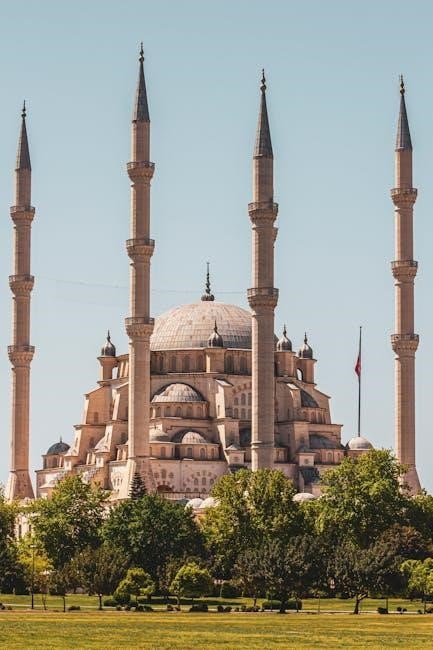
Practical Steps for Pilgrims
Pilgrims must prepare both physically and financially, ensuring they are spiritually ready for the journey․ Seeking Allah’s guidance and adhering to Islamic teachings are essential for a fulfilling pilgrimage․
Physical and Financial Preparation for Hajj
Physical stamina is crucial for Hajj, as pilgrims engage in extensive walking and rituals․ Ensuring good health through proper diet and exercise is essential before embarking on the journey․
Financial preparation involves saving funds for travel, accommodation, and essential supplies․ It is important to avoid debt and budget wisely to fulfill the pilgrimage’s requirements․
Pilgrims must also secure valid travel documents, including a passport and visa, and complete health screenings as mandated by Saudi authorities․ Spiritual intentions should accompany material preparations to align with the sacred purpose of Hajj․
In Islam, financial integrity is emphasized, ensuring that all expenses are from halal sources․ Pilgrims are encouraged to seek Allah’s guidance in their preparations, trusting in His provision and support throughout the journey․
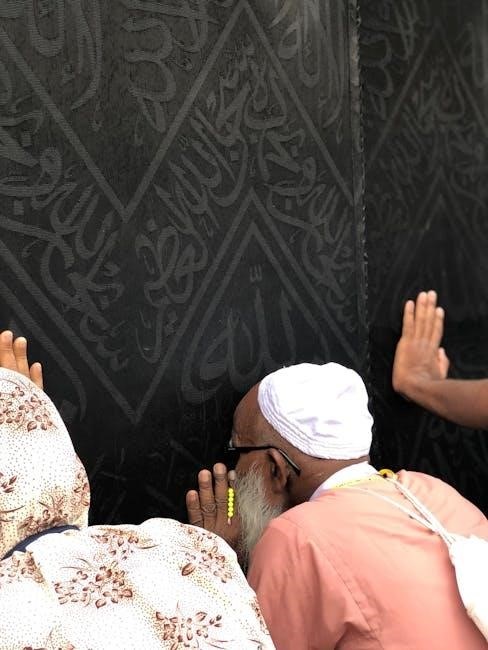
Spiritual Purification and Intentions Before the Journey
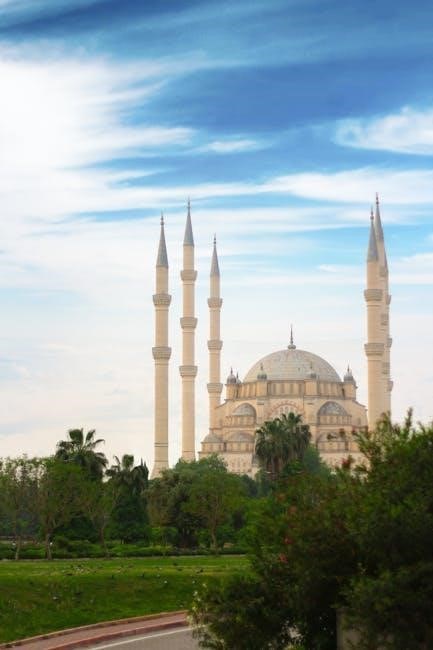
Spiritual purification is a cornerstone of preparing for Hajj, requiring pilgrims to cleanse their hearts and minds․ This involves seeking forgiveness, performing repentance, and engaging in acts of worship such as prayer and charity․
Intention plays a vital role, as pilgrims must dedicate their journey solely to seeking Allah’s pleasure․ The Prophet (peace be upon him) emphasized sincerity, stating that actions are judged by their intentions․
Pilgrims are encouraged to detach from worldly distractions, focusing on spiritual growth․ They should also study Hajj rituals to ensure they perform them correctly, reflecting a deep commitment to Allah’s guidance and commands․
By aligning their intentions with divine purpose, pilgrims embody the essence of submission and humility, fostering a profound connection with Allah before embarking on the sacred journey․
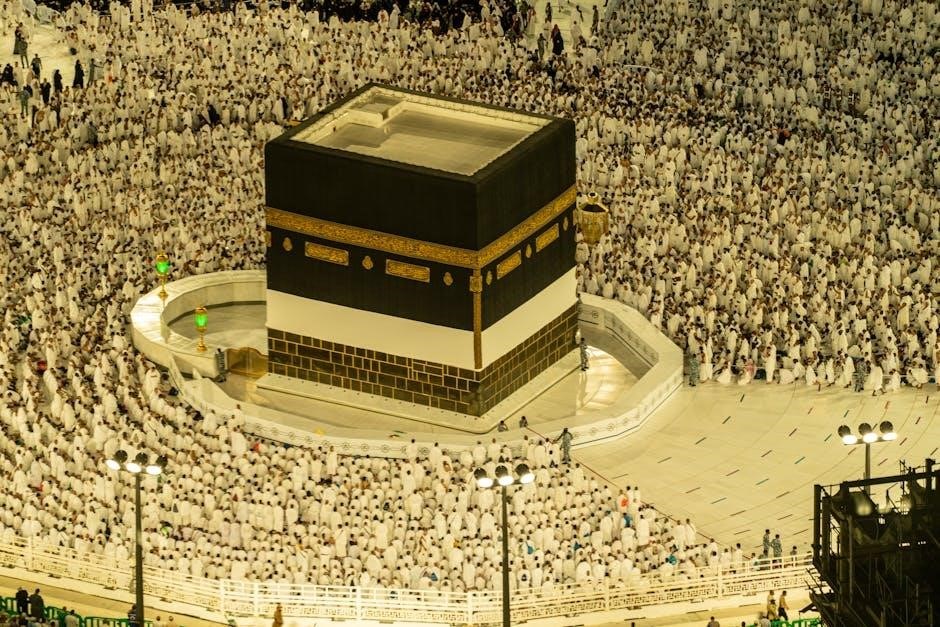
The Rituals and Ceremonies of Hajj
Hajj rituals include Ihram, Tawaf, Sa’i, and the Day of Arafat, symbolizing obedience to Allah’s commands and unity among pilgrims seeking spiritual guidance and divine mercy․
The State of Ihram and Its Rules
The state of Ihram is a sacred condition pilgrims enter before performing Hajj or Umrah, symbolizing detachment from worldly desires and full submission to Allah’s will․ It involves wearing simple, unstitched garments—two white cloths for men (Izar and Rida) and modest attire for women—reflecting equality and humility․ Pilgrims must abstain from certain acts, such as trimming nails, shaving, or engaging in marital relations, to maintain purity of intention and focus on spiritual devotion․
Entering Ihram requires a pilgrim to declare their intention, often through specific prayers and supplications, seeking Allah’s guidance and forgiveness․ This state is a fundamental aspect of the pilgrimage, emphasizing the importance of spiritual preparation and adherence to divine commands․ By following these rules, pilgrims embody the principles of obedience and surrender, essential for a meaningful and accepted Hajj․
The Tawaf (Circumambulation of the Kaaba) Ritual
Tawaf, the circumambulation of the Kaaba, is a central ritual in Hajj and Umrah, symbolizing unity with Allah and unity among believers․ Pilgrims circle the Kaaba seven times counterclockwise, embodying the heart’s orbit around the divine․ The ritual begins with the intention to seek Allah’s pleasure, followed by reciting specific prayers and supplications․ This act of worship is a profound expression of devotion, connecting pilgrims to the sacred history of the Kaaba and the prophets who revered it․ Tawaf is a physically and spiritually demanding yet deeply fulfilling experience, reminding pilgrims of their purpose and submission to Allah’s will․
The Day of Arafat and Its Spiritual Significance
The Day of Arafat, occurring on the 9th of Dhu al-Hijjah, is the pinnacle of the Hajj pilgrimage, where millions of pilgrims gather on Mount Arafat․ This sacred day commemorates the Prophet Muhammad’s (peace be upon him) final sermon, emphasizing the unity of humanity and the equality of all believers before Allah․ Pilgrims engage in heartfelt prayers, supplications, and reflections, seeking forgiveness and divine mercy․ The day symbolizes the culmination of spiritual journey and renewal, as believers reconnect with Allah’s guidance․ It is a powerful reminder of the importance of humility, repentance, and devotion, embodying the essence of Allah’s compassion and grace․
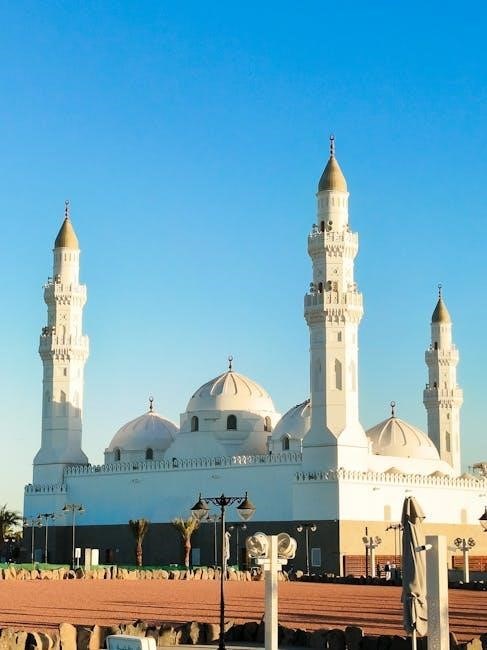
Reflections on the Pilgrimage Experience
Pilgrims reflect on their journey, expressing gratitude for Allah’s guidance and grace․ The experience fosters spiritual renewal, humility, and a deeper connection to their faith and humanity․
Lessons Learned and Personal Growth Through Hajj
The Hajj is a transformative experience that teaches profound lessons in patience, humility, and self-reflection․ Pilgrims often return with a renewed sense of purpose, having strengthened their connection to Allah․ The journey fosters resilience and unity, as millions gather in equality, reminding believers of the true essence of faith and brotherhood․ Many find personal growth through acts of worship, such as the Tawaf and the Day of Arafat, which deepen spiritual awareness and gratitude․ The Prophet (peace be upon him) emphasized sincerity in worship, a lesson pilgrims carry forward in their daily lives․ Ultimately, Hajj leaves an indelible mark, inspiring believers to maintain their spiritual state and strive for righteousness, guided by Allah’s wisdom and mercy․
How to Maintain Spiritual Guidance After the Pilgrimage
Maintaining spiritual guidance after Hajj requires consistent effort and dedication to Allah’s teachings․ Pilgrims should cultivate gratitude, reflecting on the blessings received during the journey․ Daily prayer, remembrance of Allah, and recitation of the Quran strengthen spiritual connection․ Engaging in righteous deeds, such as charity and kindness, helps sustain the sacred state․ Reflecting on the lessons learned during Hajj and applying them to daily life is crucial․ Staying connected with fellow pilgrims and seeking knowledge from scholars can further nurture spiritual growth․ By trusting in Allah’s guidance and striving to live a virtuous life, believers can preserve the blessings of Hajj and continue their journey toward spiritual excellence and closeness to Allah․
Allah’s guidance in the pilgrimage fosters enduring spiritual growth, transforming lives through faith, obedience, and divine connection, leaving a lasting impact on every pilgrim’s journey and heart․
The Lasting Impact of Allah’s Guidance on Pilgrims
The pilgrimage, guided by Allah’s divine wisdom, leaves an indelible mark on pilgrims’ lives․ It fosters profound spiritual transformation, strengthening their trust and reliance on Allah’s plan․ Through the rituals and reflections, pilgrims gain clarity in faith, embodying the teachings of the Quran and the Prophet’s Sunnah․ The journey cultivates humility, patience, and gratitude, reshaping their worldview and actions․ Upon returning, pilgrims often feel renewed, striving to uphold righteousness and compassion in their daily lives․ This sacred experience becomes a lifelong source of inspiration, reminding them of Allah’s mercy and guidance in every step of their journey․